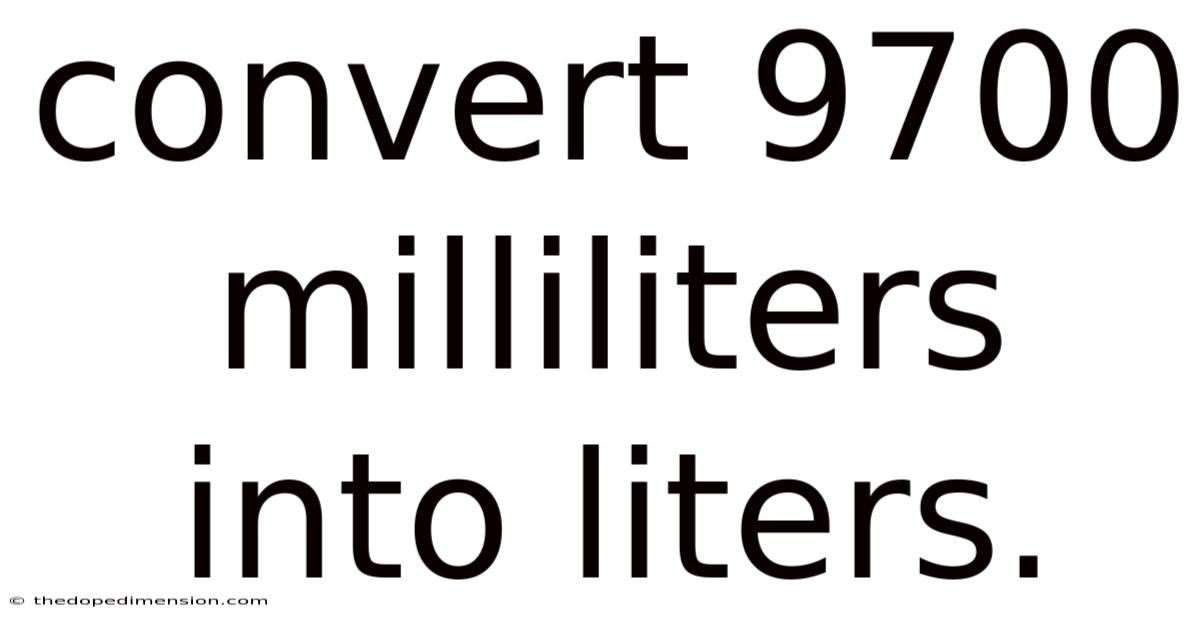Convert 9700 Milliliters Into Liters.
thedopedimension
Sep 13, 2025 · 4 min read

Table of Contents
Converting 9700 Milliliters into Liters: A Comprehensive Guide
This article provides a comprehensive guide on how to convert 9700 milliliters (ml) into liters (L). We'll explore the fundamental concepts behind metric conversions, provide a step-by-step solution, delve into the scientific basis of the conversion, address frequently asked questions, and explore real-world applications of this conversion. Understanding this seemingly simple conversion is crucial in various fields, from cooking and medicine to engineering and scientific research. This guide ensures you not only understand the answer but also the underlying principles, making you confident in handling similar metric conversions.
Understanding the Metric System and its Prefixes
The metric system, or International System of Units (SI), is a decimal system based on powers of 10. This makes conversions within the system relatively straightforward. It uses prefixes to denote multiples or submultiples of the base unit. For volume, the base unit is the liter (L). A milliliter (ml) is a submultiple of a liter, representing one-thousandth of a liter. Other common prefixes include:
- Kilo (k): 1000 times the base unit (e.g., 1 kiloliter = 1000 liters)
- Hecto (h): 100 times the base unit
- Deka (da): 10 times the base unit
- Deci (d): 1/10 of the base unit
- Centi (c): 1/100 of the base unit
- Milli (m): 1/1000 of the base unit
Understanding these prefixes is key to navigating the metric system and performing conversions efficiently.
Step-by-Step Conversion of 9700 Milliliters to Liters
The conversion from milliliters to liters is a simple one, relying on the relationship: 1 liter = 1000 milliliters.
Therefore, to convert 9700 milliliters to liters, we perform the following calculation:
-
Identify the conversion factor: The conversion factor is 1000 ml/L (or 1 L/1000 ml). This means 1000 milliliters are equal to 1 liter.
-
Set up the conversion: We can set up the conversion as a fraction:
9700 ml * (1 L / 1000 ml) -
Perform the calculation: Notice that the "ml" units cancel each other out, leaving us with liters:
(9700 / 1000) L = 9.7 L
Therefore, 9700 milliliters is equal to 9.7 liters.
The Scientific Basis of the Conversion
The conversion is based on the fundamental definition of the metric prefixes. The prefix "milli" signifies 1/1000. Thus, a milliliter is one-thousandth of a liter. This relationship is consistent across all units within the metric system, ensuring uniformity and ease of conversion. The use of powers of 10 simplifies calculations and reduces the possibility of errors compared to systems using non-decimal bases.
Real-World Applications: Where This Conversion is Useful
The conversion between milliliters and liters is used extensively across numerous fields:
-
Cooking and Baking: Recipes often use milliliters to measure liquids, especially in international contexts. Converting to liters can be useful for scaling recipes up or down.
-
Medicine: Medication dosages are frequently measured in milliliters, especially for liquid medications. Understanding the conversion is essential for accurate administration.
-
Chemistry and Science: In laboratories, the precise measurement of volumes is crucial. Converting between milliliters and liters is a fundamental skill for scientists and researchers.
-
Engineering: In various engineering disciplines, precise measurements are required. This conversion ensures consistency and accuracy in calculations.
-
Everyday Life: From measuring fuel efficiency in vehicles (often expressed in liters per 100 kilometers) to understanding the capacity of various containers, the conversion is vital for practical understanding.
Frequently Asked Questions (FAQ)
Q: Can I convert liters to milliliters using the same principle?
A: Absolutely! You would simply reverse the process. To convert liters to milliliters, multiply the number of liters by 1000. For example, 2.5 liters would be 2.5 L * 1000 ml/L = 2500 ml.
Q: Are there any other common volume units besides liters and milliliters?
A: Yes, other common volume units in the metric system include kiloliters (kL), cubic centimeters (cc or cm³), and cubic meters (m³). Cubic centimeters are frequently used in medical contexts, and cubic meters are used in larger-scale applications. Conversions between these units also involve powers of 10.
Q: What if I have a volume measurement that isn't a whole number?
A: The conversion process remains the same. For example, converting 3750.5 ml to liters would be 3750.5 ml * (1 L / 1000 ml) = 3.7505 L.
Q: Why is the metric system preferred for scientific work?
A: The metric system's decimal base and consistent use of prefixes make it significantly easier to perform calculations and reduce the chances of errors compared to other systems, such as the imperial system. This consistency and simplicity are vital for scientific accuracy and reproducibility.
Conclusion: Mastering Metric Conversions
Converting 9700 milliliters to 9.7 liters is a fundamental skill that transcends simple arithmetic. It demonstrates an understanding of the metric system's logical structure and the importance of consistent units in various fields. Mastering this conversion, and the underlying principles, empowers you to confidently tackle similar conversions and fosters a deeper appreciation for the uniformity and elegance of the metric system. The ability to easily convert between units is crucial for accuracy and efficiency in various aspects of life, from everyday tasks to complex scientific endeavors. By understanding the step-by-step process and the underlying scientific principles, you've equipped yourself with a valuable tool for future applications.
Latest Posts
Latest Posts
-
Convert 2000 Meters To Miles
Sep 13, 2025
-
1pt Equals How Many Cups
Sep 13, 2025
-
40 000 Acres To Miles
Sep 13, 2025
-
Convert 3 Centimeters To Millimeters
Sep 13, 2025
-
250 Km H In Mph
Sep 13, 2025
Related Post
Thank you for visiting our website which covers about Convert 9700 Milliliters Into Liters. . We hope the information provided has been useful to you. Feel free to contact us if you have any questions or need further assistance. See you next time and don't miss to bookmark.